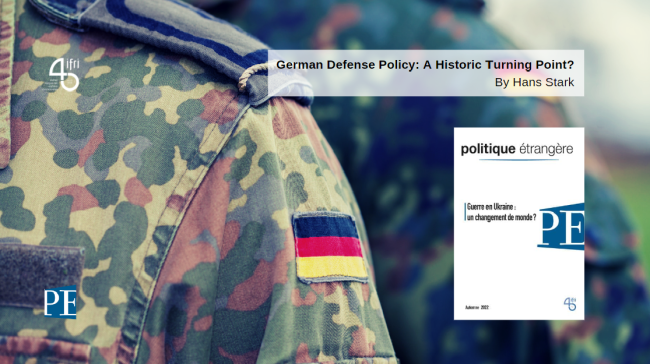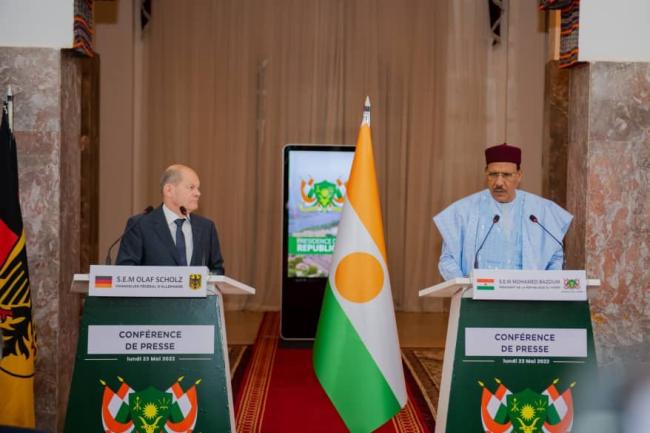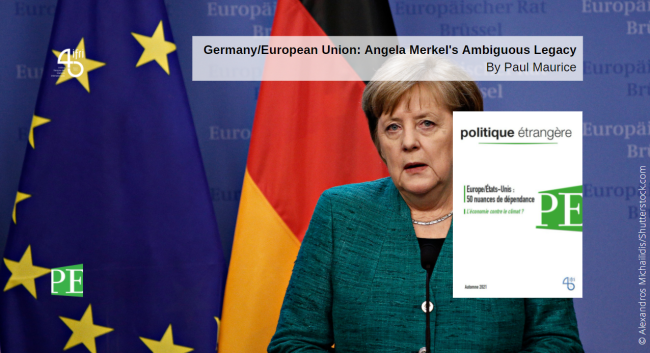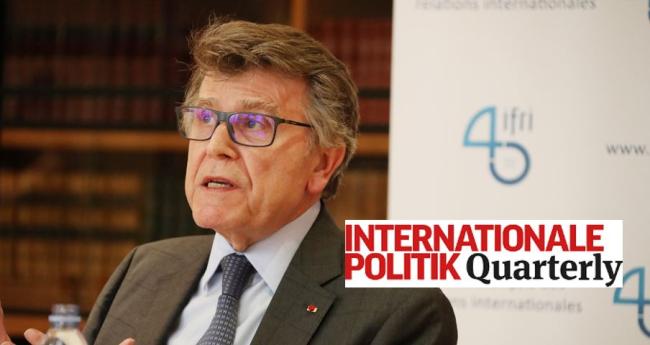
The Cumbersome Legacy of the SPD’s Policy Towards Vladimir Putin’s Russia
The Social Democratic Party of Germany (SPD) looks back with pride on the history of its Ostpolitik, which it sees as having paved the way for German reunification. With the firm will to continue this Ostpolitik after the end of the Cold War, SPD politicians of the last 20 years have, within the framework of their government responsibility, focused on a partnership with Russia, which had the goal of contributing to the democratization of Russia through bilateral trade and mutual interdependence.
Attention to the Periphery? Germany and the Pacific Island States
In September 2020, Germany adopted policy guidelines for the Indo-Pacific that comprehensively set out its approach towards this increasingly important region, seeking to diversify partnerships beyond China.
German Defense Policy: A Historic Turning Point?
The war in Ukraine has been a rude awakening for Berlin.

War in Ukraine: A New World?
Beyond the tactical sphere, the conflict in Ukraine has already had numerous repercussions, and its conclusion will provoke many more in the global system. In this special issue, Politique étrangère explores some potential outcomes.
After Mali, what Commitment from Germany in the Sahel?
Germany, despite the reluctance of its public opinion, is committed to supporting security in the Sahel, notably through its participation in the European Union Training Mission in Mali (EUTM) and recently in Niger, and in the United Nations Multidimensional Integrated Stabilization Mission in Mali (MINUSMA).
What foreign policy for Germany after the end of the Merkel era?
One cannot help but wonder about Germany’s future foreign policy when one considers both the weight of the Federal Republic and the many crises we face internationally.
Germany/European Union: Angela Merkel’s Ambiguous Legacy
Angela Merkel is ending her fourth term as German Chancellor. Although she has made a number of statements demonstrating her commitment to the European project, her record in this area nevertheless appears to be mixed.

Europe/United States: 50 Shades of Dependence
Is Joe Biden’s United States (US) returning to multilateral, traditional diplomacy? This more open stance does not eliminate either its domestic problems or the divergence in interests separating the US from the Europeans: how will open diplomacy fit in with the priority of defending US interests? Will Washington organize a broad anti-Chinese coalition that the Europeans are opposed to? Will sanctions with their resulting effects remain at the heart of US strategy? Will the Europeans be able to assert their sovereignty in the key area of new technologies against the US giants?
Toward a New German Foreign Policy. Stepping Into the 21st Century
To adapt its foreign policy to new challenges, Germany must overcome certain taboos inherited from its history.

Germany: The Power Out of Phase
Germany has enjoyed a decade of sustained economic growth, benefiting from a very low unemployment rate and considerable trade and budgetary surpluses. This phase is now coming to an end. Some even believe that the German economic model needs to be rethought.
Attention to the Periphery? Germany and the Pacific Island States
In September 2020, Germany adopted policy guidelines for the Indo-Pacific that comprehensively set out its approach towards this increasingly important region, seeking to diversify partnerships beyond China.
The “2014 Review”: Understanding the Pillars of German Foreign Policy and the Expectations of the Rest of the World
German foreign policy is today confronted with a number of fundamental challenges. The country has become larger and has again become strong economically and must no longer content itself with its former role as France’s political junior partner in Europe or the United States’ junior partner in the world. At the same time, Berlin is far from being fully prepared for taking over this new role – deficits are both strategic and conceptual.

Germany's Unnecessary Hegemony
Based on the realist theory of international relations, this article analyses whether Germany has any incentives to seek (regional) hegemony. It concludes that under the current systemic circumstances – in which the country's survival is ensured by the United States – Germany has no reason to become a hegemon, which is normally a strategy to escape the perils of the anarchic international system.
Germany and the Arab Spring
Much of the analyses of German reactions to the Arab Spring uprisings have focused on Germany’s contentious decision relating to Libya. By siding with the critics of military intervention in abstaining from UNSC 1973, Germany vexed its allies and arguably displayed an astonishing lack of geostrategic foresight and moral rectitude.
Support independent French research
Ifri, a foundation recognized as being of public utility, relies largely on private donors – companies and individuals – to guarantee its sustainability and intellectual independence. Through their funding, donors help maintain the Institute's position among the world's leading think tanks. By benefiting from an internationally recognized network and expertise, donors refine their understanding of geopolitical risk and its consequences on global politics and the economy. In 2025, Ifri supports more than 80 French and foreign companies and organizations.













